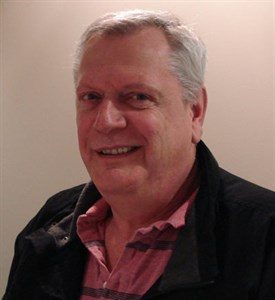Interview, Michael Dinsmore, USA
 Michael Dinsmore (b. 1947) was born and raised in Rochester, New York. He studied graphic arts and printing at the Rochester Institute of Technology, but his education was interrupted when he was drafted into the United States Army in October 1969. Dinsmore received his basic training at Fort Dix, in New Jersey, and his Advanced Infantry Training at Fort Lewis, in Washington State. He was stationed in the mountains of Vietnam’s Central Highlands, near the boarders of Laos and Cambodia. During the war, Dinsmore performed ground reconnaissance for air units and also worked as a troop photographer. He was honorably discharged from the military in November 1970 and returned to Rochester and his job with the Case-Hoyt printing company. Dinsmore finished his degree at RIT and worked in the printing business until his retirement in 2002, when he went to work part-time with the Transportation Security Administration (TSA) at the Greater Rochester International Airport. Dinsmore retired from the TSA in 2007. He continued to keep in touch with other veterans as a life member of both the Veterans of Foreign Wars (VFW) and the Vietnam Veterans of America (VVA), Chapter 20.
Michael Dinsmore (b. 1947) was born and raised in Rochester, New York. He studied graphic arts and printing at the Rochester Institute of Technology, but his education was interrupted when he was drafted into the United States Army in October 1969. Dinsmore received his basic training at Fort Dix, in New Jersey, and his Advanced Infantry Training at Fort Lewis, in Washington State. He was stationed in the mountains of Vietnam’s Central Highlands, near the boarders of Laos and Cambodia. During the war, Dinsmore performed ground reconnaissance for air units and also worked as a troop photographer. He was honorably discharged from the military in November 1970 and returned to Rochester and his job with the Case-Hoyt printing company. Dinsmore finished his degree at RIT and worked in the printing business until his retirement in 2002, when he went to work part-time with the Transportation Security Administration (TSA) at the Greater Rochester International Airport. Dinsmore retired from the TSA in 2007. He continued to keep in touch with other veterans as a life member of both the Veterans of Foreign Wars (VFW) and the Vietnam Veterans of America (VVA), Chapter 20.
During his interview, Dinsmore discusses his Advanced Infantry Training, in which he learned survival skills and how to use different types of weapons. He recalls his initial fear upon arriving in Vietnam and notes that he eventually became accustomed to the dangers of war. He shares stories of enemy attacks, and becomes emotional as he recalls the brutality that he both witnessed and participated in. He doubts whether anyone who was not there would be able to understand what he and his fellow servicemen went through and finds Apocalypse Now and Full Metal Jacket to be the most accurate of all the films made about the Vietnam War. Dinsmore discusses military culture and the chain of command and explains how sometimes commanding officers would be killed, or “fragged,” by their own men. He recalls his resentment over the lack of support from Americans who were opposed to the war and disagrees with the leniency that the government eventually showed to those who evaded the draft. He compares the Vietnam War to the subsequent wars in Iraq and Afghanistan, noting the difference between jungle and urban warfare. Dinsmore further reflects on the lasting effects of the war and the help he has received from the United States Department of Veterans Affairs (VA).
